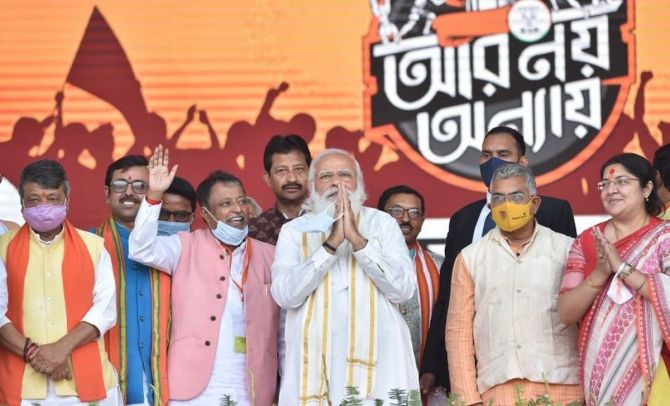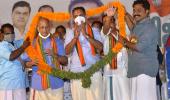Never before in the history of the Republic has an election in the state mattered so much as it does now, observes Virendra Kapoor.

Prime Minister Narendra Modi's wish for a simultaneous poll for the Lok Sabha and state assemblies has a singular merit insofar as it would help governance dominate the discourse for at least four-and-a-half years ahead of the five-yearly electoral cycle.
But realising that one-country, one-poll goal seems hard, especially given so much partisanship around.
So, we have to live with frequent elections in one or the other part of the country, detracting the focus from serious matters of development and growth.
Having said that, let us say that weeks before the Election Commission set out the schedule for the latest round of assembly polls, the ruling BJP was already in election mode.
So driven is its leadership that almost round-the-year it engages in revving up the organisation machine, enlisting new members, weaning away leaders from other parties and generally spreading the message of its goodness and honourable intentions.
The party has shown remarkable energy and ambition to win power in more and more states after the advent of the Gujarat duo of Modi and Shah at its helm.
Indeed, in Modi it has a one-man army which is willing and ready to crush challenge from all quarters.
Now, of the four states, namely Kerala, Tamil Nadu, Assam and West Bengal, and the lone Union Territory of Puducherry, which will elect new legislatures between March 27 and April 29, without doubt the most significant outcome will be in West Bengal.
Never before in the history of the Republic has an election in the state mattered so much as it does now.
The result will impact the national polity whether Mamata Banerjee succeeds or fails in repulsing the concerted saffron onslaught.
The motley Opposition, disheartened and in complete disarray, will sink further into despair should the BJP succeed in denying the Trinamool Congress a successive third term in power.
Most pundits do not rule out such an outcome, though it is always hard to predict an Indian election whether federal or provincial given multiple factors at play.
Without doubt, the stakes for the fire-emitting Mamata are far higher than for the saffron party.
But whatever the election result, you have to concede that the BJP has in super quick time established itself as a formidable influence in the West Bengal polity.
A state where the BJP was barely a post-box entity till the advent of Modi in 2014, for it to be in the running for power is an extraordinary story of political mobilization and grassroots organisational work.
A cadre-based party like the BJP, without question, has emerged as a serious challenger to the ruling regional force, the Trinamool Congress, pushing the older and once powerful parties like the Communists and the Congress far behind.
In fact, it is indicative of the BJP's organisational work in West Bengal in the last couple of years, that the Communists and the Congress, not long ago fierce rivals, have had to join hands in order to stay relevant in the state.
Not only is the outcome in West Bengal the most significant in this round of elections but should the BJP succeed in stopping Mamata riding back to power the prime minister's stock would zoom further.
The Opposition, or what passes for it, would disintegrate further into smithereens.
Make no mistake about it. It may be state elections, but the prime minister is the chief campaigner for the ruling party.
As it is, the poll-talk in Kolkata's addas has turned it into a direct fight between Modi versus Mamata.
Their parties do not matter. Of course, Mamata too is a one-woman army, leading her bedraggled troops in a war when some of her top generals had already defected to the enemy side.
She cannot be easily written off, regardless of all that the BJP has thrown into this fiercest of electoral wars, with the central investigating agencies rendering further assistance to its cause.
On the other hand, should the alliance for survival that the fading Left and the fast diminishing Congress have stitched together eat into the Trinamool vote it will only make the BJP task easier.
By all accounts, the Congress-Left alliance will emerge a poor third despite it getting on board a popular Muslim cleric.
Also, Asaduddin Owaisi is set to make foray into West Bengal, fielding his own candidates.
Any division in the near one-third Muslim electorate will be to the BJP's advantage in a highly polarised poll, with the influx of illegal Bangladeshi migrants serving as a dog-whistle for the party to consolidate the majority vote behind it.
It is significant that of late Mamata has been at pains to shake off the charge of Muslim appeasement.
On its part, the BJP glories in its image of being a pro-Hindu party.
In short, the West Bengal outcome will have serious national repercussions.
Meanwhile, in Tamil Nadu the rival DMKs will slug it out yet again, with the BJP allied with the incumbent AIADMK.
Post-Jayalalithaa, Chief Minister Edappadi Palaniswami was on shaky ground, challenged from within by his ministerial colleague and now number two O Panneerselvam.
Under the circumstances, the BJP smuggled itself in, rendering help to Palaniswami to consolidate his position in return for leverage.
As a result, the AIADMK is set to accommodate the BJP in ticket distribution, both in Tamil Nadu and Puducherry.
The first election after J Jayalalithaa's demise, it will help clarify the AIADMK's future under a hitherto untested leadership.
For the DMK too it will be the first election after M K Karunanidhi's death.
The Kalaingar's chosen heir, M K Stalin, still faces tough resistance from his elder brother M K Alagiri who has considerable influence with the DMK cadres in southern Tamil Nadu.
Alagiri had publicly threatened to float a rival outfit to challenge Stalin.
The rival Dravida fronts will also vie for power in neighbouring Puducherry as well.
This is the first serious attempt by the BJP to ride on the shoulders of a Dravida party into power both in Tamil Nadu and Puducherry should the AIADMK emerge victorious.
In neighbouring Kerala, despite much noise about the 88-year-old Metro Man E Sreedharan joining the BJP, it will be tough for the party to win more than a seat or two.
As for Assam, despite the confusion over CAA and NPR, the outgoing BJP regime seems to be in a position to retain power, especially when the Congress after former chief minister Tarun Gogoi's death lacks a charismatic leader.
Overall, in the next two months, the political slugfest in the states going to the polls is bound to dominate the national discourse, taking the eye off from serious issues of governance.
We seem to be condemned to stay perennially in election mode.
Feature Presentation: Aslam Hunani/Rediff.com










